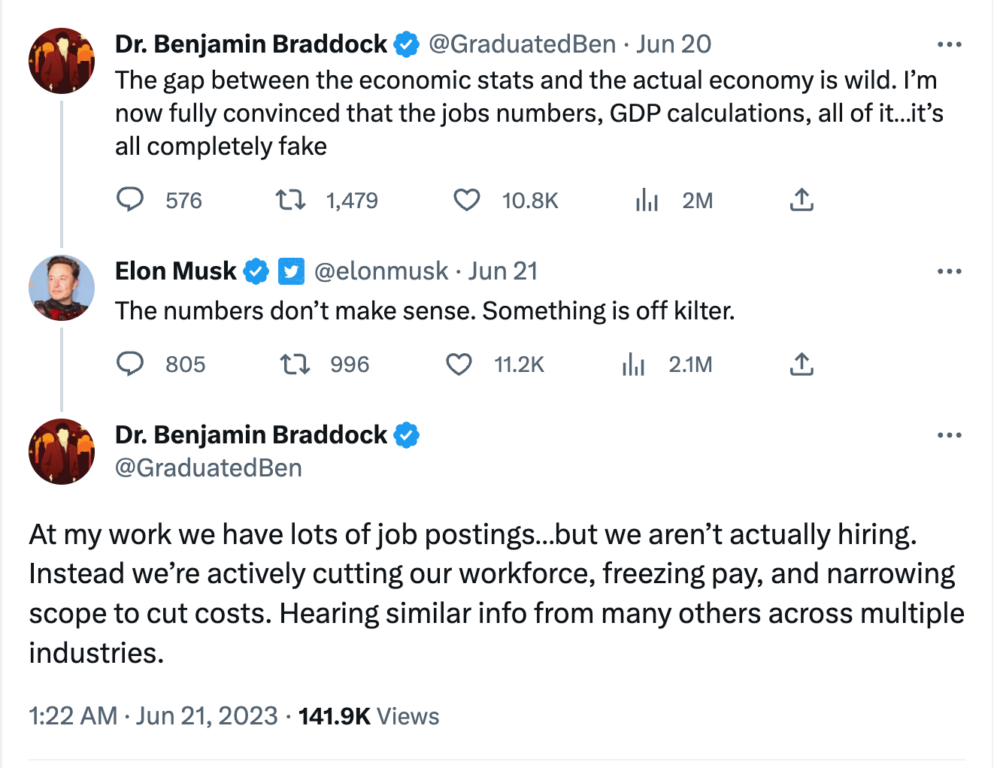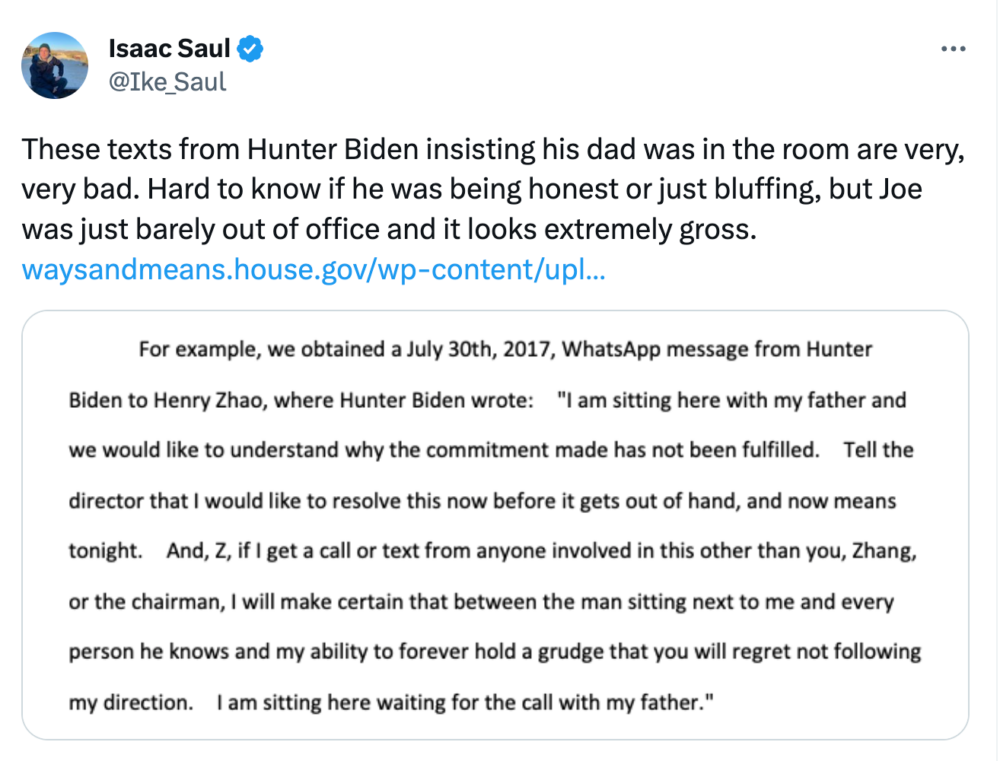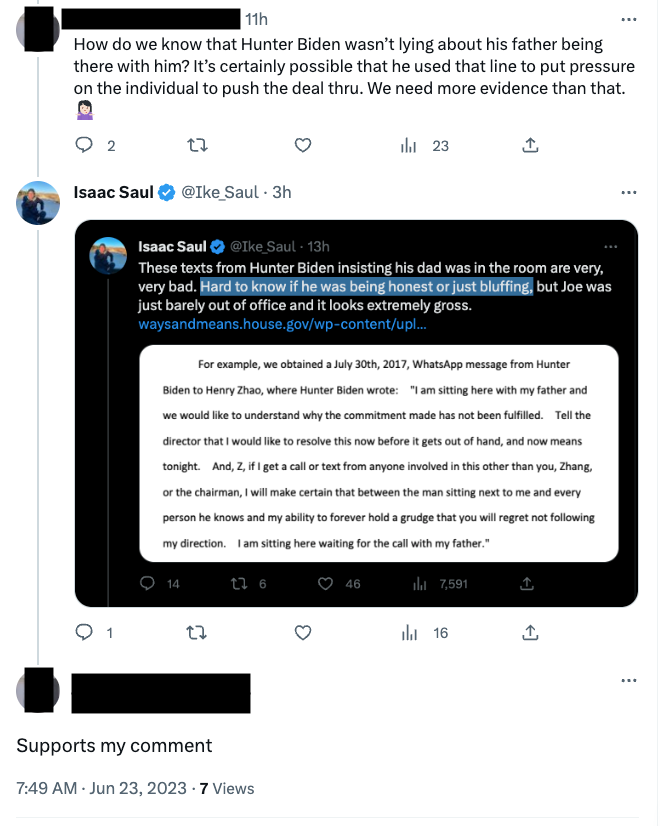
Note from Jane: Today’s post is somewhat tangential to the usual focus of this site, but I’d argue—for nonfiction writers anyway—knowing how to make a decent argument is fundamental to persuasive writing, op-ed writing, and overall literary citizenship. It’s something that I taught in writing classes, in fact, because the students needed the information. Desperately.
Last month, when I was writing and commenting on the AI fraud situation, I encountered some of the most voluble debate of my career—along with some of the most egregious straw-man arguments I’ve ever seen. Sometimes I wondered if people were serious about the points they were making or just really confused. In any event, I often wished for more good-faith arguments from people interested in thoughtful debate.
I have been a subscriber to a newsletter called Tangle for the better part of a year now. It looks at political issues and current events in the US and summarizes what people on both sides are saying. I greatly appreciate how it engages in thoughtful and reasoned debate. Recently, I recommended it in my free newsletter, Electric Speed, and the people at Tangle reached out to me to see if I’d be interested in cross-posting one of their articles on how to make better arguments—by avoiding really bad ones. I immediately said yes.
Because Tangle mainly covers political news and events, the examples you’ll find here are drawn from the political arena. It is probably the first and last time you’ll ever find overtly political content at this site. Keep in mind it’s to illustrate the hallmarks of bad argument and not meant to invite everyone into a political debate. For that reason, I’m turning off comments on this post due to the inevitability of that happening.
If you do wish to comment on this article (in a non-political fashion), you can reach out to me directly through my contact form, or you can comment on social media where I will be sharing this post (Facebook, Twitter, LinkedIn). Political comments will be deleted swiftly.
This post is by Isaac Saul, founder of Tangle—and adapted from a Tangle article published on June 23, 2023.
We need more debate.
I’m a firm believer that one of the biggest issues in our society—especially politically—is that people who disagree spend a lot less time talking to each other than they should.
Earlier in June, I wrote about how the two major political candidates are dodging debates. The next week I wrote about how a well known scientist (or someone like him) should actually engage Robert F. Kennedy Jr. on his views about vaccines.
In both cases, I received a lot of pushback. There are, simply put, many millions of Americans who believe that some minority views—whether it’s that the 2020 election was stolen or vaccines can be dangerous or climate change is going to imminently destroy the planet or there are more than two genders—are not worth discussing with the many people who hold those viewpoints. Many of these same people believe influential voices are not worth airing and are too dangerous to be on podcasts or in public libraries or in front of our children.
On the whole, I think this is wrongheaded. I’ve written a lot about why. But something I hadn’t considered is that people are skeptical about the value of debate because there are so many dishonest ways to have a debate. People aren’t so much afraid of a good idea losing to a bad idea; they are afraid that, because of bad-faith tactics, reasonable people will be fooled into believing the bad idea.
Because of that, I thought it would be a good idea to talk about all the dishonest ways of making arguments.
The nature of this job means not only that I get to immerse myself in politics, data, punditry, and research, but that I get a chance to develop a keen understanding of how people argue—for better, and for worse.
Let me give you an example.
Recently, we covered Donald Trump’s fourth indictment, when a grand jury in Fulton County, Georgia, indicted former President Donald Trump and 18 others over allegations of a sprawling conspiracy to overturn Joe Biden’s election victory in Georgia. As usual, we got some feedback and criticism from our readers—which we welcome. A couple people asked why Hillary Clinton isn’t also getting indicted, since she also has disputed that she lost a fair and open election.
This, of course, got me talking about the differences in these cases. Clinton conceded the election the night it was called, Trump didn’t. Clinton’s supporters didn’t swarm the Capitol hoping to overturn the results while she—as president—was silent. Trump’s supporters did, and he was.
Then we started having a conversation about what Hillary Clinton did do. She did say that the election was illegitimate and that Russia tampered, and continues to. She did use a private email server…
And now the topic of conversation has changed, from “did Trump deserve to be indicted” to “should Hillary Clinton have been indicted?”
This is an example of “whataboutism,” where the person you’re talking to or arguing with asks you about a different but similar circumstance, and in doing so changes the subject.
Whataboutism
This is probably the argument style I get from readers the most often. There is a good chance you are familiar with it. This argument is usually signaled by the phrase, “What about…?” For instance, anytime I write about Hunter Biden’s shady business deals, someone writes in and says, “What about the Trump children?” My answer is usually, “They also have some shady deals.”
The curse of whataboutism is that we can often do it forever. If you want to talk about White House nepotism, it’d take weeks (or years) to properly adjudicate all the instances in American history, and it would get us nowhere but to excuse the behavior of our own team. That is, of course, typically how this tactic is employed. Liberals aren’t invoking Jared Kushner to make the case that profiting off your family’s time in the White House is okay, they are doing it to excuse the sins of their preferred president’s kid—to make the case that it isn’t that bad, isn’t uncommon, or isn’t worth addressing until the other person gets held accountable first.
Now, there are times when this kind of argument is useful, and sometimes even enlightening. If we are truly asking where the line for prosecutable conduct is for a presidential candidate, it’s useful to find precedent and see where it is being applied inconsistently. If we’re asking “is the government consistent,” comparing Clinton, Trump, Biden, Nixon—it’s all on the table. The same is true if we’re asking about the bias of media organizations, and seeing if they cover similar stories differently, if the subject of the story is the major element that’s changing.
But if I write a story that says your favorite political candidate answered a question in a very poor way, and you respond by saying, “Well, this other politician said something bad, too—I think even worse. What about that statement?” That wouldn’t be helpful, or enlightening.
Furthermore, context is important. If I’m writing about Hunter Biden’s business deals I may reference how other similar situations were addressed or spoken about in the past. But when the topic of discussion is whether one person’s behavior was bad, saying that someone else did something bad does nothing to address the subject at hand. It just changes the subject.
Straw man arguments
This is another common tactic, and it’s one you have probably heard of. A straw man argument is when you build an argument that looks like, but is different than, the one the other person is making—like a straw man of their argument. You then easily defeat that argument, because it’s a weaker version.
For instance, in a debate on immigration, I recently made the argument that we should pair more agents at the border with more legal opportunities to immigrate here, a pretty standard moderate position on immigration. I was arguing with someone who was on the very left side of the immigration debate, and they responded by saying something along the lines of, “The last thing we need is more border agents shooting migrants on the border.”
Of course, my argument isn’t for border agents to shoot migrants trying to cross into the U.S., which is a reprehensible idea that I abhor. This is a straw man argument: Distorting an opposing argument to make it weaker and thus easier to defeat.
Unfortunately, straw man arguments are often effective as a rhetorical tactic. They either derail a conversation or get people so off-track that their actual stance on an issue becomes unclear. For the purposes of getting clarity on anyone’s position or having an actual debate, though, they are useless.
The weak man
There are different terms for this but none of them have ever really stuck. I like Scott Alexander’s term, the weak man, which he describes this way: “The straw man is a terrible argument nobody really holds, which was only invented so your side had something easy to defeat. The weak man is a terrible argument that only a few unrepresentative people hold, which was only brought to prominence so your side had something easy to defeat.”
The weak man is best exemplified by the prominence of certain people. For instance, have you ever heard of Ben Cline? What about Marjorie Taylor Greene? I’d wager that most of my readers know quite a few things about Greene, and very few have ever even heard of Ben Cline. Both are Republican representatives in Congress. One is a household name, and the other is an under-the-radar member of the Problem Solvers Caucus. Why is that?
Because Greene is an easy target as “the weak man.” Democrats like to use her to portray the Republican party as captured by QAnon, conspiracy theories, and absurd beliefs because they found social media posts where she spouted ridiculous ideas about space lasers and pedophilia rings.
The weak man is largely responsible for the perception gap, the reality in our country where most Democrats vastly misunderstand Republicans and vice versa. For instance, more than 80% of Democrats disagree with the statement “most police are bad people.” But if you ask Republicans to guess how Democrats feel about that statement, they guess less than 50% disagree; because the weak man is used so effectively that it distorts our understanding of the other side’s position.
Anecdotal reasoning
An anecdote is a short story about something that really happened. Anecdotal reasoning is using that real event to project it as the norm, and then make an argument that your lived experience is representative.
Frankly, I’m hesitant to include this one in the context of today’s post, because I do think politics are personal—and personal experiences should be shared and considered. They are often enlightening, and anyone who reads Tangle knows I regularly lean into personal experience. But they can also be a trap. Anecdotal arguments are dangerous because they can prevent people from seeing that their experience might be the exception rather than the rule.
We actually just had a great example of this, too. As you may have heard, our economy is—by most traditional measures—doing well right now. Unemployment, for instance, is near an all-time low. At the same time, though, the tech sector (which is a fraction of the economy) has been experiencing a lot of layoffs and downsizing. This has left many people in tech concluding that the job numbers are somehow wrong or being fudged. Take a look at this exchange on X/Twitter:

This is a classic example of an anecdotal argument. Because personal experiences are so powerful, we struggle to see beyond them. While anecdotes can add color or create context, they shouldn’t be used to extract broad conclusions.
Circular reasoning
I would never make one of these bad arguments. And because I wouldn’t make a bad argument, this argument I’m making isn’t a bad argument. And I am not a person who makes bad arguments, as evidenced by this argument I’m making, which isn’t a bad argument.
Exhausting, right? That’s an example of circular reasoning, which uses two claims to support one another rather than using evidence to support a claim. This style of argument is pretty common in supporting broad-brush beliefs. Here are a few examples:
- Women make bad leaders. That’s why there aren’t a lot of female CEOs. That there are not a lot of female CEOs proves that women are bad leaders.
- People who listen to Joe Rogan’s podcast are all anti-vaccine. I know this because RFK Jr. was recently on the podcast spreading lies about vaccines, which proves that his anti-vaccine audience wants to hear lies about vaccines.
- The media is lying to us about the election in 2020 getting stolen. If the media were honest, they’d tell us that the election had been stolen. And the fact that the dishonest media isn’t telling us that is more proof that the election was stolen.
Circular arguments are usually a lot harder to identify than this, and because they’re self-enforcing are often incredibly difficult to argue against. In practice, there are usually a lot more bases to cover that reinforce a worldview, and it’s difficult to address one claim at a time when someone is making a circular argument.
Of course, these aren’t all the ways to make dishonest arguments. There are a lot of others.
There is the “just asking questions” rhetorical trick, where someone asks something that sounds a lot like an outlandish assertion, and then defends themselves by suggesting they don’t actually believe this thing—they’re just asking if maybe it’s worth considering.
There is “black and white” arguing, where an issue becomes binary this or that (is Daniel Penny a good samaritan or a killer?) rather than a complex issue with subtleties, as most things actually are. There’s ad hominem argument, when someone attacks the person (“RFK Jr. is a crackpot!”) rather than addressing the ideas (“RFK Jr. is wrong about vaccine safety because…”). There is post hoc—the classic correlation equals causation equation fallacy (“The economy grew while I was president, therefore my policies caused it to grow.”). There are slippery slope arguments (“If we allow gay marriage to be legal, what’s next? Marrying an animal?”) and false dichotomy arguments (like when Biden argued that withdrawing from Afghanistan was a choice between staying indefinitely or pulling out in the manner that he did). There is also the “firehose” trick, or the Gish Gallop, which essentially amounts to saying so many untrue things in such a short period of time that refuting them all is nearly impossible.
In reality, a lot of the time we’re just talking past each other. There is one particularly annoying example of this I run into a lot, which is when people interpret what you said as something that you didn’t (close to a straw man argument), or ignore something you did say and then repeat it back to you as if you didn’t say it. This happened to me the morning I wrote this article on X/Twitter (of course).
It started when news broke recently about an IRS whistleblower testifying on damning text messages from Hunter Biden that were obtained through a subpoena. I tweeted out a transcript of the message Hunter Biden purportedly sent to a potential Chinese business partner. In the message, Hunter insists his father is in the room with him, and they are awaiting the call from the potential partner. Obviously, this would undercut President Biden’s frequent claims that he had nothing to do with Hunter’s business dealings.
I tweeted this:

“It’s a WhatsApp message, whose to say Joe was even in the room?” one user responded.
“Addicts tend to lie a lot, don’t they? Steal from grandma and such?” another person said.
“Hunter was a crack addict at the time. A crack addict lying for money??? No!!” someone else wrote.
Of course, I aired this possibility right there in my tweet. Again, emphasis mine, I said: “These texts from Hunter Biden insisting his dad was in the room are very, very bad. Hard to know if he was being honest or just bluffing, but Joe was just barely out of office and it looks extremely gross.”
But as people, we often come into conversations already knowing what point we want to make, and we’ll try to make it regardless of what the other person said. In one case, when I pointed out that I had literally suggested this very thing in my tweet, someone responded that it buttressed their point—as if I had never said it all.

Of course, just as important as spotting these rhetorical tricks is being sure you are not committing them yourselves. Dunking on bad ideas, styling ideas few people believe as popular, or using anecdotes to make broad claims are easy ways to “win” an argument. Much more difficult, for all of us, is to engage the best ideas you disagree with, think about them honestly, and explain clearly why you don’t agree. And even more difficult is to debate honestly, discover that the other person has made stronger arguments, adapt your position and grow. Because of the current media landscape, arguments that don’t contain these bad-faith tactics aren’t always the ones that end up in my newsletter, Tangle—but they are the kind of arguments I aspire to employ myself, and the ones I think we should all strive to make.

Isaac Saul is the Executive Editor of Tangle, a non-partisan news organization covering American politics. Want to read more from him? You can sign up at readtangle.com to receive newsletters straight to your inbox every week from Monday to Thursday for free, or pay to receive special editions on Fridays.
